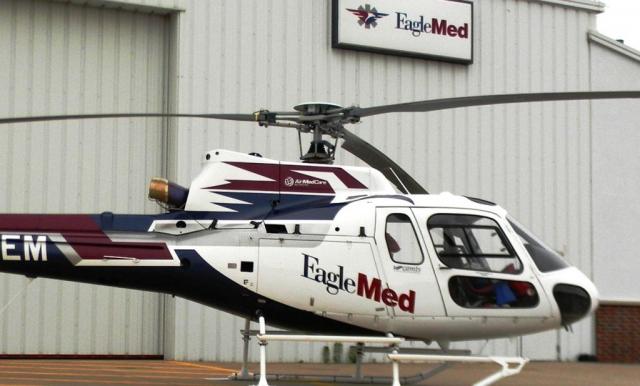 EagleMed LLC critical care air medical transport has taken delivery of a new Airbus AS350 AStar helicopter outfitted with the most advanced aviation technology and latest life-saving medical equipment.
EagleMed LLC critical care air medical transport has taken delivery of a new Airbus AS350 AStar helicopter outfitted with the most advanced aviation technology and latest life-saving medical equipment.
This new helicopter becomes the 15th Airbus helicopter in EagleMed’s state-of-the-art critical care air medical transport fleet, which is dedicated to serving rural America. EagleMed selected the Airbus AS350 AStar, a field-proven and highly dependable aircraft, as the company continues to upgrade its all-Airbus air medical transport fleet.
“As EagleMed expands and continues to modernize our rotor wing fleet, the AS350 is our go-to aircraft for critical care air medical transports,” said EagleMed President Larry Bugg. “We are committed to providing safe, world-class patient care and the Airbus AStar has proven itself to be extremely reliable during thousands of air medical flights through the years,” he added. Metro Aviation, of Shreveport, La., configured the AStar’s medical interior.
During 2014, EagleMed added critical care air medical transport operations in Houston, Texas; Cody Wyo.; and Butte, Mont. The company also added five medically equipped Beechcraft King Air twin-engine turboprop aircraft, bringing its King Air fleet to 20 aircraft.
Safety Focus
FAA SMS – The Federal Aviation Administration Safety Management System (SMS) Program Office (SMSPO) recently acknowledged the full implementation of the EagleMed SMS and validated the Company as “SMS Voluntary Program (SMSVP) Active Conformance.” This designation is the highest level attainable in the SMSVP and EagleMed is the only Part 135 charter certificate holder in the FAA Central Region to achieve this significant distinction.
ARGUS Platinum – EagleMed recently achieved the ARGUS International Platinum Rating. ARGUS International is the most comprehensive, accurate, and detailed third-party safety analysis and due diligence system for charter operators in the world. ARGUS utilizes an independent, unbiased, and proprietary rating algorithm “CHEQ System” to evaluate the charter operator’s legitimacy as a charter operator; factual safety history; liability insurance confirmation; current aircraft and pilot background checks; pilot training, experience, certifications, and type ratings. EagleMed is one of only two air medical operators in the nation to achieve the coveted Platinum Rating.
CAMTS – EagleMed is a Commission on Accreditation of Medical Transport Services (CAMTS) critical care air medical transport service. CAMTS accreditation represents the “Gold Standard” for air medical operators and validates the organization’s focus on patient care and safety across the entire spectrum of air medical transport services.
EagleMed’s senior aviation, maintenance, and safety leadership has a combined total of more than 150 years of aviation operational experience. Recognized as a leader in the industry, the organization and its employees received the 2013 Chairman’s Award and the 2010 President’s Award for Leadership and Safety from the Association of Air Medical Services. EagleMed also received the 2011 Safety Award from the Helicopter Association International, Best Practice in Just Culture from CAMTS, and the 2012 Pilot of the Year Award from the National EMS Pilots Association.
EagleMed leverages technology through its web-based Learning Management System and IS-BAO registered Baldwin SMSlite™ system to deliver regulatory, aircraft-specific, air medical resource management, SMS, risk management, just culture, threat and error management, OSHA safety compliance training and safety report data tracking and analysis. EagleMed maintains a technologically advanced Communications Center with satellite tracking and communications for 24/7 oversight and medical direction and dispatch provided by a cadre of emergency physicians and highly trained communication staff that are certified emergency medical technicians.
EagleMed’s experienced and proficient team of commercial instrument rated rotor and Airline Transport Pilot rated fixed wing pilots undergo extensive hands-on training every six months including FlightSafety International simulation training.




